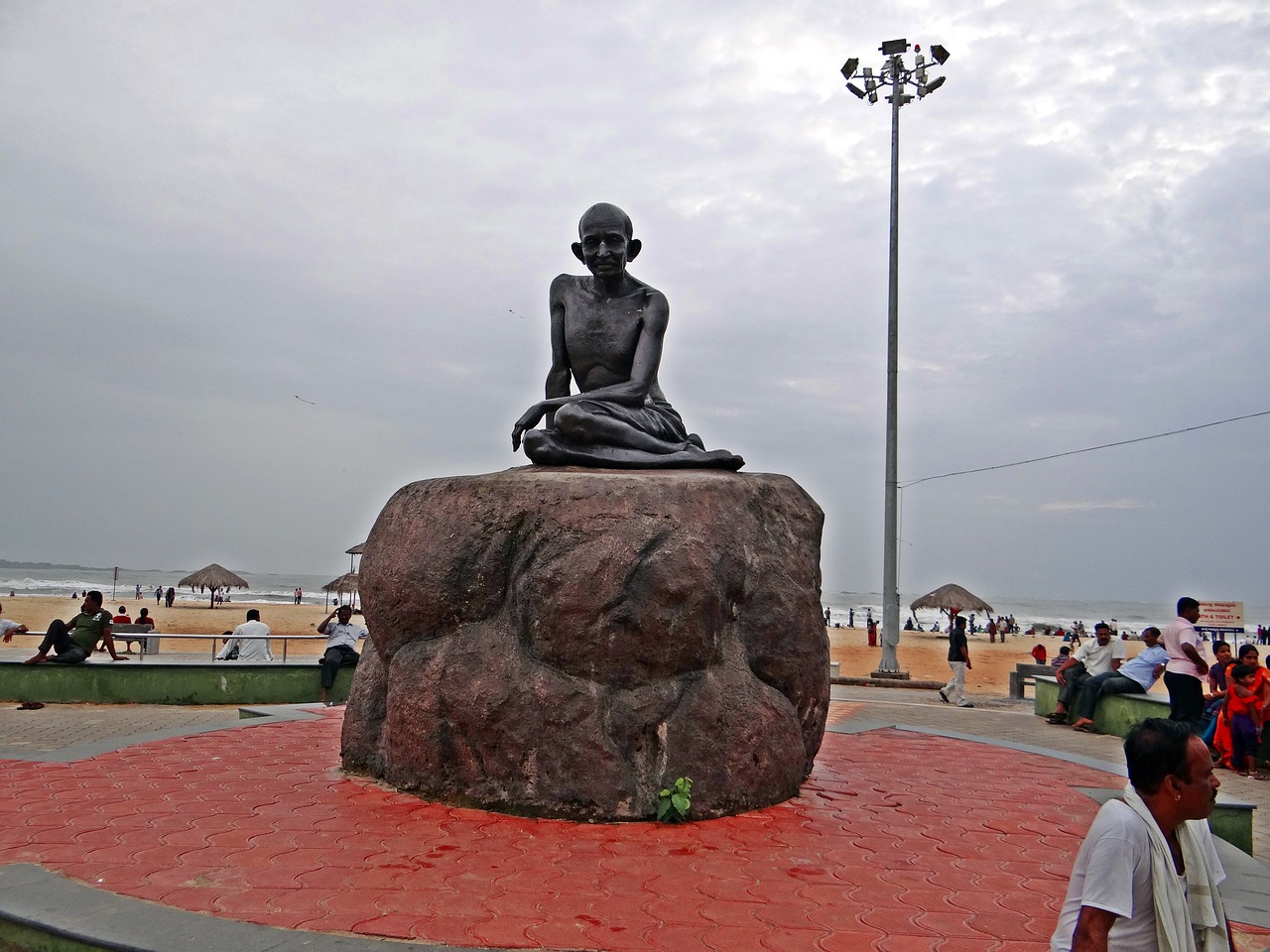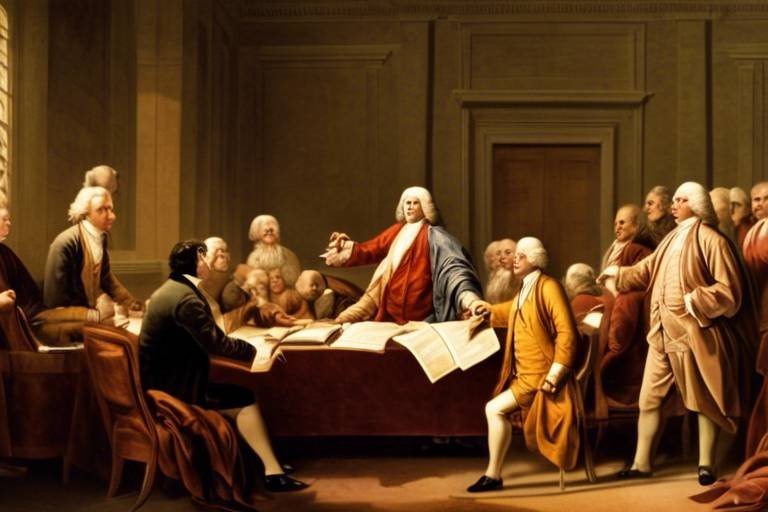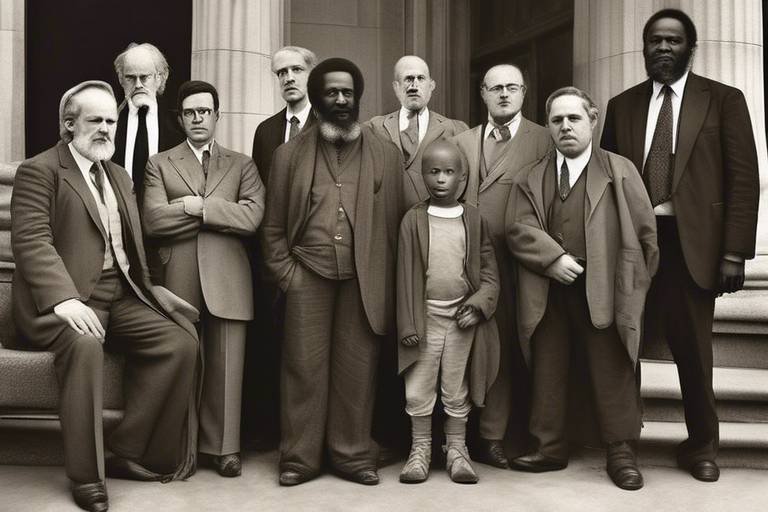The Influence of Ghandian Philosophy on Politics
The world of politics is often seen as a battleground, where power struggles and conflict reign supreme. However, the teachings of Mahatma Gandhi offer a refreshing perspective that emphasizes peace, truth, and social justice. Gandhi's philosophy, deeply rooted in the principles of non-violence, has transcended borders and time, influencing political ideologies and movements across the globe. From the bustling streets of India during the struggle for independence to the civil rights movements in the United States, Gandhi's approach has inspired countless leaders and ordinary individuals alike to advocate for change through peaceful means.
At the heart of Ghandian philosophy lies a profound belief in the power of non-violence (Ahimsa), which serves as a guiding light for those seeking social and political transformation. Gandhi understood that true change could not be achieved through violence; instead, he championed the idea that peaceful resistance could dismantle oppressive systems. This concept resonates even today, as we witness modern movements striving for justice and equality. The ripple effect of Gandhi's teachings can be seen in various campaigns around the world, where activists harness his principles to challenge injustices.
Moreover, Gandhi's commitment to truth (Satya) and self-reliance (Swadeshi) further enriches his philosophy, providing a framework for ethical governance and accountability. In a political landscape often marred by corruption and dishonesty, Gandhi's emphasis on integrity serves as a reminder that leaders must prioritize the truth to build trust with their constituents. This focus on moral leadership is increasingly relevant in today's world, where citizens demand transparency and ethical practices from their governments.
As we delve deeper into the influence of Ghandian philosophy on politics, it becomes clear that his teachings are not merely historical relics but living principles that continue to inspire and guide contemporary movements. The challenge lies in applying these ideals in a world that often favors aggression over dialogue. Nevertheless, the legacy of Gandhi persists, urging us to consider how we can incorporate his wisdom into our political actions and societal structures.
- What is Ghandian philosophy?
Ghandian philosophy is centered around principles such as non-violence, truth, and self-reliance, which were championed by Mahatma Gandhi in his quest for social justice and political change.
- How did Gandhi influence modern movements?
Gandhi's teachings on non-violence and civil disobedience have inspired various movements, including the Civil Rights Movement in the United States and anti-apartheid efforts in South Africa.
- What are the core principles of Ghandian philosophy?
The core principles include Ahimsa (non-violence), Satya (truth), and Swadeshi (self-reliance), which advocate for peaceful resistance and ethical governance.
- Can Ghandian philosophy be applied today?
Yes, Ghandian philosophy remains relevant today, encouraging leaders and activists to prioritize ethical practices and social equity in their efforts for change.

Historical Context of Ghandian Philosophy
To truly grasp the essence of Ghandian philosophy, it's essential to delve into the historical context that shaped Mahatma Gandhi's life and teachings. Born in 1869 in Porbandar, India, Gandhi grew up during a time when India was under British colonial rule. This period was marked by widespread social injustices, economic exploitation, and a growing desire for independence among the Indian populace. Gandhi's early experiences in South Africa, where he faced racial discrimination, played a pivotal role in shaping his understanding of social justice and the need for peaceful resistance against oppression.
Gandhi's philosophy emerged as a response to the struggles faced by his people. His approach was not just about seeking freedom from colonial rule; it was about transforming society through ethical means. The Indian National Congress became a platform for Gandhi to advocate for non-violent resistance, which he termed Ahimsa. This principle was rooted in the belief that true change could only be achieved through love and understanding, rather than through violence and hatred. His experiences during the Champaran Satyagraha and the Kheda Satyagraha were significant moments that illustrated his commitment to non-violent protest.
Moreover, the historical backdrop of the early 20th century was characterized by a global wave of movements advocating for rights and freedoms. Leaders around the world were beginning to recognize the power of peaceful protests. Gandhi's teachings resonated not only in India but also across the globe, inspiring figures like Martin Luther King Jr. and Nelson Mandela. The universality of his message, which emphasized truth and justice, paved the way for a new kind of political activism that prioritized ethical considerations over brute force.
In essence, the historical context of Ghandian philosophy is a rich tapestry woven with threads of struggle, resilience, and a profound commitment to justice. Gandhi's life was a testament to the idea that change is possible when grounded in moral integrity and compassion. His legacy continues to inspire movements for justice and equality around the world, reminding us that the path to change is often as important as the change itself.

Core Principles of Ghandian Philosophy
Mahatma Gandhi's philosophy is a rich tapestry woven from several core principles that have transcended time and geography, resonating deeply with political ideologies and movements across the globe. At the heart of his teachings are the concepts of Ahimsa (non-violence), Satya (truth), and Swadeshi (self-reliance). Each of these principles serves as a guiding light for individuals and leaders striving for social justice and political reform.
Ahimsa, or non-violence, is perhaps the most recognized aspect of Gandhi's philosophy. It is not merely the absence of violence; rather, it is a proactive stance that promotes peaceful resistance and civil disobedience as effective tools for enacting change. Gandhi believed that true strength lies in the ability to confront oppression without resorting to violence. This principle has found fertile ground in various civil rights movements around the world, where activists seek to challenge injustice while maintaining moral high ground.
Next, we encounter the principle of Satya. This pursuit of truth is fundamental to Gandhi's worldview. He posited that honesty and integrity are crucial in political discourse and governance. In a world often clouded by misinformation and deceit, Gandhi's insistence on truth serves as a reminder that transparency and accountability should be the bedrock of any political system. Leaders who embrace Satya foster trust among their constituents, paving the way for a more engaged and informed citizenry.
Lastly, the principle of Swadeshi emphasizes self-reliance and local empowerment. Gandhi championed the idea that communities should support themselves through local resources and industries, rather than relying on external entities. This principle is particularly relevant today as we face global challenges such as climate change and economic inequality. By encouraging individuals to take ownership of their local economies, Gandhi's philosophy inspires a sense of community and responsibility that can lead to sustainable practices.
In summary, the core principles of Ghandian philosophy—Ahimsa, Satya, and Swadeshi—serve as powerful tools for political and social change. They encourage a holistic approach to governance and activism, one that prioritizes ethical considerations and the well-being of all. As we navigate the complexities of contemporary politics, revisiting these principles can provide invaluable insights and guidance for leaders and activists alike.
- What is Ahimsa? Ahimsa is the principle of non-violence, advocating for peaceful resistance as a means of achieving social change.
- How did Gandhi influence civil rights movements? Gandhi's teachings inspired leaders like Martin Luther King Jr. and Nelson Mandela, who adopted his non-violent approach to combat oppression.
- What does Swadeshi mean? Swadeshi refers to self-reliance and the idea that communities should support themselves through local resources.
- Why is Satya important in politics? Satya emphasizes the importance of truth and integrity in governance, fostering trust and accountability among leaders and citizens.

Ahimsa: The Principle of Non-Violence
Ahimsa, which translates to non-violence, is not just a principle for Gandhi; it is a way of life that resonates deeply within the fabric of his philosophy. This profound concept advocates for peaceful resistance and civil disobedience as powerful tools for achieving political and social change. Imagine a world where conflicts are resolved through dialogue and empathy rather than aggression. This is the vision that Gandhi championed, believing that true strength lies in the ability to endure suffering without retaliation.
At its core, Ahimsa challenges us to rethink our approach to conflict. Instead of responding with anger or violence, Gandhi urged individuals to respond with love and understanding. He famously stated, "An eye for an eye only ends up making the whole world blind." This radical idea not only reshaped the political landscape of India but also inspired countless movements around the globe. The essence of Ahimsa is about creating a ripple effect of peace, where one act of kindness can lead to another, fostering an environment where dialogue prevails over discord.
The beauty of Ahimsa lies in its adaptability. It has found its way into various modern movements, demonstrating its timeless relevance. For instance, the Black Lives Matter movement draws from Gandhi's teachings, employing non-violent protests to address systemic injustices faced by marginalized communities. Such movements remind us that while the methods may evolve, the underlying principles of Ahimsa remain steadfast.
However, the path of non-violence is not without its challenges. In a world often marred by violence and conflict, the application of Ahimsa can seem daunting. Critics question its effectiveness, especially in situations where oppression is rampant and voices are silenced. Yet, Gandhi believed that true change requires patience and perseverance. He once said, "You must be the change you wish to see in the world." This call to action emphasizes that while external circumstances may be tough, the internal commitment to non-violence can lead to transformative outcomes.
To illustrate the impact of Ahimsa, let's consider some key movements influenced by this principle:
| Movement | Key Figure | Impact |
|---|---|---|
| Indian Independence Movement | Mahatma Gandhi | Led to the end of British colonial rule in India through non-violent protests. |
| Civil Rights Movement (USA) | Martin Luther King Jr. | Utilized non-violent resistance to combat racial segregation and injustice. |
| Anti-Apartheid Movement | Nelson Mandela | Promoted peaceful protests against apartheid in South Africa. |
In conclusion, Ahimsa is more than just a principle; it is a guiding light for those seeking justice and equality. It encourages individuals to rise above hatred and violence, fostering a culture of peace and understanding. As we navigate through the complexities of modern society, the teachings of Gandhi remind us that the power of non-violence is not just a strategy; it is a profound commitment to humanity itself.
- What is Ahimsa? Ahimsa is the principle of non-violence advocated by Mahatma Gandhi, emphasizing peaceful resistance and compassion towards all living beings.
- How did Gandhi apply Ahimsa in his life? Gandhi practiced Ahimsa through non-violent protests, civil disobedience, and promoting dialogue as a means to achieve political and social change.
- Is Ahimsa relevant in today's world? Yes, Ahimsa remains highly relevant as many contemporary movements, such as Black Lives Matter, continue to utilize non-violent methods to address systemic injustices.

Ahimsa in Modern Movements
Ahimsa, the principle of non-violence championed by Mahatma Gandhi, has transcended time and borders, manifesting itself in various modern movements that seek to address systemic injustices and promote social change. This powerful philosophy serves as a guiding light for activists around the globe, illustrating that peaceful resistance can challenge even the most entrenched systems of oppression. One of the most notable examples is the Black Lives Matter movement, which emerged in response to the pervasive violence and discrimination faced by Black individuals in the United States. Drawing inspiration from Gandhi's teachings, this movement emphasizes the importance of non-violent protest as a means of advocating for racial equality and justice.
Moreover, the principles of Ahimsa have found resonance in various global protests and campaigns, including those advocating for environmental justice, women's rights, and LGBTQ+ rights. For instance, the Fridays for Future climate movement, initiated by Greta Thunberg, embodies a peaceful yet urgent call to action against climate change, urging society to adopt sustainable practices without resorting to violence. This reflects Gandhi's belief that true change comes from a place of compassion and understanding, rather than aggression.
However, the application of Ahimsa in modern contexts is not without its challenges. Many activists grapple with the question of whether non-violence remains an effective strategy in the face of systemic violence and oppression. In some cases, the urgency of social issues can lead to frustration, pushing individuals and groups to consider more aggressive tactics. Yet, the enduring legacy of Gandhi's philosophy serves as a reminder that non-violent methods can yield powerful results, as seen in historical movements that successfully dismantled oppressive regimes.
In conclusion, Ahimsa continues to play a pivotal role in modern movements, inspiring countless individuals to advocate for change through peaceful means. By embracing Gandhi's principles, activists not only honor the legacy of a great leader but also contribute to a more just and equitable world. The essence of Ahimsa reminds us that the path to social justice is often paved with patience, resilience, and a commitment to peaceful dialogue.
- What is Ahimsa? Ahimsa is the principle of non-violence, which advocates for peaceful resistance and compassion towards all living beings.
- How has Ahimsa influenced modern movements? Ahimsa has inspired various movements, such as Black Lives Matter and environmental activism, promoting peaceful protests and social justice.
- Are there challenges to implementing Ahimsa today? Yes, many activists face challenges when advocating for non-violence, especially in contexts of systemic violence and oppression.

Challenges to Ahimsa
While Ahimsa, or the principle of non-violence, is a powerful and noble philosophy, its application in real-world scenarios is often fraught with challenges. In societies where violence is rampant, the notion of achieving political goals through peaceful means can seem almost idealistic, if not outright unrealistic. Imagine trying to extinguish a raging fire with a gentle breeze; sometimes, the force of the flames can be overwhelming, making it hard to see how a soft approach could ever succeed.
One of the primary challenges to the practice of Ahimsa is the existence of deeply entrenched violence within communities. When individuals and groups are subjected to oppression, their instinctive response may lean towards aggression rather than peaceful resistance. This raises a critical question: can one truly advocate for peace in the face of overwhelming hostility? The answer is complex and often varies based on individual circumstances.
Moreover, the effectiveness of Ahimsa can be undermined by the following factors:
- Societal Norms: In cultures where violence is normalized, promoting non-violence may be met with skepticism or outright hostility. People may view peaceful protests as signs of weakness rather than strength.
- Political Repression: In authoritarian regimes, the state often responds to non-violent movements with brutal crackdowns, making it exceedingly difficult for activists to maintain their commitment to Ahimsa.
- Public Perception: The media often glorifies violent resistance, overshadowing the efforts of those who choose peaceful means. This can lead to a lack of support for non-violent movements.
Despite these challenges, history has shown that non-violent movements can indeed effect change, albeit often requiring immense patience and resilience. The enduring legacy of Gandhi's teachings serves as a beacon of hope for those who believe in the transformative power of non-violence. As the world continues to grapple with issues of inequality and injustice, the principles of Ahimsa may still hold the key to fostering a more peaceful and just society.
Q1: What is Ahimsa?
Ahimsa is the principle of non-violence, advocating for peaceful resistance and civil disobedience as effective means to achieve political and social change.
Q2: How has Ahimsa been applied in modern movements?
Many contemporary movements, such as Black Lives Matter, draw inspiration from Gandhi's non-violent approach, illustrating its relevance in addressing systemic injustices today.
Q3: What are the main challenges to practicing Ahimsa?
The main challenges include societal norms that favor violence, political repression from authoritarian regimes, and public perception that often glorifies violent resistance.
Q4: Can Ahimsa be effective in the face of violence?
While it can be challenging, history shows that non-violent movements can lead to significant change, requiring immense patience and resilience from those who advocate for it.

Satya: The Pursuit of Truth
Satya, or truth, is not just a concept in Ghandian philosophy; it is the very essence that fuels the engine of justice and integrity in political discourse. Gandhi believed that truth is a powerful weapon in the fight against oppression and injustice. In a world often clouded by deceit and manipulation, the pursuit of truth becomes a radical act of courage. It’s like shining a light in a dark room; it reveals what’s hidden and challenges the status quo. When politicians and leaders embrace truth, they create a foundation of trust with their constituents, which is essential for a healthy democracy.
Gandhi's commitment to truth was evident in his personal life and political activism. He famously stated, "Truth alone will endure, all the rest will be swept away before the tide of time." This conviction drove him to practice Satyagraha, a form of non-violent resistance grounded in the truth. It was not merely about opposing injustice but doing so with a commitment to honesty and integrity. Gandhi’s approach teaches us that the means we choose to pursue our goals are just as important as the ends themselves. If the means are rooted in truth, the outcomes are likely to be just.
In contemporary politics, the absence of truth can lead to a breakdown of trust between leaders and the public. When leaders prioritize personal gain or manipulate facts, they create a toxic environment that breeds cynicism and disengagement among citizens. This is why the principles of Satya are more relevant than ever. They remind us that accountability and transparency should be at the forefront of governance. For example, when political leaders openly acknowledge their mistakes and commit to rectifying them, they foster a culture of honesty that can inspire others.
Moreover, the pursuit of truth is not limited to political leaders; it extends to every individual in society. In a time when misinformation spreads like wildfire, being a seeker of truth is crucial. It requires critical thinking and a willingness to question narratives that may seem convenient but lack integrity. As Gandhi once said, "An error does not become a mistake until you refuse to correct it." This highlights the importance of being open to learning and growing, both as individuals and as a society.
In conclusion, Satya is about more than just telling the truth; it is a commitment to living in accordance with it. It challenges us to be honest with ourselves and others, to seek justice in our communities, and to hold our leaders accountable. As we navigate the complexities of modern politics, embracing Satya can pave the way for a more just and equitable society. The ripple effect of living truthfully can inspire movements and change that resonate far beyond our immediate circles.
- What is Satya in Ghandian philosophy?
Satya refers to the pursuit of truth, which Gandhi considered a vital principle for achieving justice and integrity in both personal and political life.
- How did Gandhi apply the principle of Satya?
Gandhi applied Satya through Satyagraha, a method of non-violent resistance that emphasizes truth and moral integrity as tools for social change.
- Why is the pursuit of truth important in politics today?
The pursuit of truth is crucial for building trust between leaders and citizens, ensuring accountability, and fostering a healthy democracy.

Impact on Civil Rights Movements
The influence of Mahatma Gandhi's philosophy on civil rights movements around the globe is nothing short of remarkable. His teachings on non-violence and truth have served as a guiding light for many leaders who sought to challenge oppression and injustice. The profound impact of Gandhi's principles can be seen in the actions and philosophies of prominent figures like Martin Luther King Jr. and Nelson Mandela, who infused their movements with Ghandian ideals to create lasting change.
One of the most notable examples is the civil rights movement in the United States during the 1950s and 1960s. Martin Luther King Jr. was deeply inspired by Gandhi's approach to social change. He famously stated, "I am convinced that non-violence is the most potent weapon available to the oppressed." This belief shaped his strategies, leading to significant events such as the Montgomery Bus Boycott and the March on Washington. King's ability to mobilize thousands of people to peacefully protest against racial discrimination showcased the effectiveness of Ghandian principles in a contemporary context.
Similarly, in South Africa, the struggle against apartheid was heavily influenced by Gandhi's teachings. Nelson Mandela, who spent 27 years in prison for his fight against racial segregation, drew on Gandhi’s philosophy of non-violent resistance. The African National Congress (ANC) adopted methods of civil disobedience and peaceful protests, inspired by Gandhi's success in India. Mandela’s commitment to reconciliation and dialogue post-apartheid further reflects the essence of Ghandian philosophy, demonstrating that true change can be achieved without resorting to violence.
Gandhi's impact extends beyond these two leaders, resonating with various social justice movements worldwide. For instance, the Black Lives Matter movement incorporates non-violence as a core principle, emphasizing peaceful protests to address systemic racism and police brutality. This modern adaptation of Ghandian philosophy illustrates its enduring relevance in today's fight for equality and justice.
However, it’s crucial to recognize the challenges faced by activists who seek to implement Ghandian principles in their movements. In societies rife with violence and oppression, the commitment to non-violence can be tested. Activists often grapple with the question: Is non-violence always the best approach? While Gandhi's teachings advocate for peace, the harsh realities of systemic injustice can make it difficult for individuals to remain committed to these ideals. Nevertheless, the overarching impact of Gandhi's philosophy on civil rights movements remains significant, inspiring countless individuals to strive for a more just and equitable world.
- What is the main principle of Ghandian philosophy? The main principles include non-violence (Ahimsa), truth (Satya), and self-reliance (Swadeshi).
- How did Gandhi influence Martin Luther King Jr.? Gandhi's philosophy of non-violence inspired King to adopt peaceful protest methods during the civil rights movement in the U.S.
- What challenges do modern movements face when applying Ghandian principles? Many movements struggle with the effectiveness of non-violence in societies marked by violence and oppression.
- Can Ghandian philosophy be applied to contemporary issues? Yes, Ghandian principles continue to be relevant, influencing various social justice movements today.

Gandhi's Influence on Martin Luther King Jr.
When we think about the American civil rights movement, one name that often shines brightly is Martin Luther King Jr.. But what many people might not realize is that King's philosophy was deeply rooted in the teachings of Mahatma Gandhi. King’s commitment to non-violence and social justice was not just a personal choice; it was a profound adoption of Gandhi’s principles, which he recognized as powerful tools for change. The connection between these two iconic figures is a testament to the universal appeal of Gandhi's ideas, transcending borders and cultures.
King first encountered Gandhi's teachings during his studies in the United States. He was captivated by the concept of Ahimsa (non-violence) and the idea that one could resist oppression without resorting to violence. This was revolutionary for King, who was grappling with the systemic racism and oppression faced by African Americans. He realized that Gandhi's methods could be effectively applied to the struggle for civil rights in America. In fact, King once said, “I am influenced by Gandhi’s teachings. I believe in non-violence.” This statement alone encapsulates the essence of their shared vision.
One of the most notable instances of Gandhi's influence on King was during the Montgomery Bus Boycott in 1955. The boycott, sparked by Rosa Parks' refusal to give up her seat to a white passenger, was a pivotal moment in the civil rights movement. King, as a leader of the boycott, employed non-violent resistance strategies that echoed Gandhi's principles. This approach not only garnered national attention but also laid the groundwork for future civil rights initiatives.
King's philosophy, heavily inspired by Gandhi, was not just about resisting oppression; it was also about creating a beloved community where justice and equality prevailed. He believed that love and understanding could conquer hate and division, a sentiment that Gandhi expressed throughout his life. King articulated this vision in his famous "I Have a Dream" speech, where he envisioned a world where people would be judged by their character rather than the color of their skin.
To illustrate the impact of Gandhi on King, we can look at some key parallels in their ideologies:
| Gandhi's Principle | King's Application |
|---|---|
| Non-violence (Ahimsa) | Advocated peaceful protests and civil disobedience |
| Truth (Satya) | Emphasized honesty and integrity in activism |
| Social Justice | Fought for equality and civil rights for African Americans |
Despite the profound impact of Gandhi’s teachings, King faced significant challenges in his quest for justice. The violent backlash against peaceful protests often tested the resolve of those who followed Gandhi’s path. However, King remained steadfast, believing that the moral high ground would ultimately lead to victory. His commitment to non-violence not only inspired his followers but also garnered support from people across the globe, further solidifying Gandhi’s influence on the civil rights movement.
In conclusion, the relationship between Gandhi and King is a beautiful example of how one person's philosophy can resonate across time and space. Gandhi’s teachings were not just theoretical; they were practical strategies for real-world change. King took these lessons and transformed them into a powerful movement for civil rights, proving that the principles of peace and justice can indeed change the world.

Gandhi's Legacy in Africa
Gandhi's philosophy of non-violence and civil disobedience did not just resonate in India; it echoed across continents, profoundly influencing liberation movements in Africa. His legacy is particularly evident in the struggle against apartheid in South Africa, where leaders like Nelson Mandela drew inspiration from Gandhi's principles. Mandela's adoption of non-violent resistance methods was a direct reflection of Gandhi's teachings, showcasing how effective peaceful protests could be in dismantling oppressive regimes.
In the early 20th century, Gandhi's time in South Africa as a lawyer and activist laid the groundwork for a unique blend of Indian and African resistance strategies. His experiences there helped him develop the concept of Satyagraha, a form of non-violent protest aimed at achieving social and political change. This methodology became a cornerstone for future African leaders who sought to challenge colonial rule and systemic injustice.
Mandela and others understood that Gandhi's approach was not merely about resisting oppression but also about fostering a sense of unity among diverse groups. They recognized that Gandhi's emphasis on community empowerment and self-reliance could be pivotal in their quests for freedom. By promoting solidarity among different ethnic and racial groups, Gandhi's teachings encouraged a collective fight against injustice, which was crucial in the multi-faceted struggles in Africa.
Moreover, the impact of Gandhi's philosophy extended beyond the confines of South Africa. Leaders across the continent, from Kwame Nkrumah in Ghana to Julius Nyerere in Tanzania, echoed his calls for peaceful resistance. They adopted his principles to advocate for independence and social justice, demonstrating that Gandhi's teachings could transcend geographical and cultural boundaries. The following table highlights key African leaders influenced by Gandhi:
| Leader | Country | Influence of Gandhi |
|---|---|---|
| Nelson Mandela | South Africa | Non-violent resistance against apartheid |
| Kwame Nkrumah | Ghana | Advocated for peaceful independence from colonial rule |
| Julius Nyerere | Tanzania | Promoted social justice and equality |
Today, Gandhi’s legacy continues to inspire activists in Africa who are committed to non-violent approaches in their fight for social justice and equality. The principles of Ahimsa (non-violence) and Satya (truth) serve as guiding lights for many who seek to address contemporary issues such as corruption, poverty, and inequality. As these movements evolve, they remain rooted in the belief that lasting change can be achieved without resorting to violence, echoing Gandhi's vision for a peaceful world.
In conclusion, Gandhi's influence in Africa is a testament to the power of his philosophy. His teachings not only shaped the political landscape of the continent but also fostered a spirit of resilience and hope among those who continue to fight for a just and equitable society. As we look to the future, the challenge remains to uphold these ideals and ensure that the legacy of Gandhi continues to inspire new generations of leaders and activists across Africa.

Ghandian Philosophy in Contemporary Politics
Today, Ghandian philosophy resonates deeply within the fabric of contemporary politics, acting as a guiding light for leaders and activists alike. The principles laid down by Mahatma Gandhi—non-violence, truth, and self-reliance—are not just relics of history; they are vital tools for addressing the complex challenges we face in modern governance. In an age where political landscapes are often marred by corruption, inequality, and violence, Gandhi's teachings offer a refreshing perspective that encourages ethical governance and social equity.
One of the most significant impacts of Ghandian philosophy in today's political arena is the push for ethical governance. Politicians and leaders are increasingly recognizing the need for integrity and transparency in their actions. This shift towards moral leadership is crucial, as it fosters trust between governments and their citizens. When leaders embody the principles of honesty and accountability, they create a political environment that is conducive to progress and social harmony. The emphasis on ethical governance can be seen in various initiatives aimed at combating corruption and promoting good practices in public administration.
Furthermore, Ghandian principles are the backbone of many social justice movements that have gained momentum in recent years. From climate activism to campaigns for racial equality, the essence of Gandhi's teachings can be found at the heart of these movements. Activists today draw from his philosophy to advocate for marginalized communities, pushing for policies that address inequality and injustice. For instance, the global climate movement emphasizes the need for sustainable practices, echoing Gandhi's call for self-reliance and respect for nature.
The influence of Ghandian philosophy is also evident in the rise of grassroots movements that prioritize community involvement and participatory governance. These movements aim to empower individuals by encouraging them to take an active role in shaping their societies. By fostering a sense of responsibility among citizens, Ghandian philosophy promotes a more inclusive political landscape where everyone's voice is valued. This approach is not only a testament to Gandhi's vision of a just society but also a practical response to the challenges of modern governance.
In conclusion, the relevance of Ghandian philosophy in contemporary politics cannot be overstated. As we navigate the complexities of today's world, the principles of non-violence, truth, and social justice serve as essential tools for creating a more equitable and compassionate society. By embracing these ideals, leaders and activists can work together to build a future that honors the legacy of Mahatma Gandhi while addressing the pressing issues of our time.
- What is Ghandian philosophy?
Ghandian philosophy is rooted in the teachings of Mahatma Gandhi, emphasizing non-violence, truth, and self-reliance as fundamental principles for political and social change.
- How does Ghandian philosophy influence modern politics?
Ghandian philosophy influences modern politics by promoting ethical governance, social justice, and grassroots movements that empower communities and advocate for marginalized voices.
- Can Ghandian principles be applied in today's political climate?
Yes, Ghandian principles can be applied in today's political climate, providing frameworks for peaceful resistance, integrity in leadership, and sustainable practices in governance.

Ethical Governance and Leadership
In a world where political scandals and corruption seem to dominate the headlines, the teachings of Mahatma Gandhi on ethical governance and leadership resonate more than ever. Gandhi believed that true leadership stems from a foundation of moral integrity, emphasizing that leaders must be accountable to the people they serve. This notion of governance is not merely about wielding power; it is about serving the community with honesty and transparency.
Gandhi's philosophy encourages leaders to reflect on their actions and decisions, asking themselves whether they align with the principles of truth and justice. In his view, ethical governance is characterized by leaders who prioritize the welfare of their constituents over personal ambition. This perspective can be summarized in a few key tenets:
- Accountability: Leaders must be answerable for their actions, ensuring that their decisions are in the best interest of the public.
- Integrity: Honesty in political discourse fosters trust between leaders and the community, creating a more stable and cooperative society.
- Service: True leadership is about serving others, not seeking power for its own sake.
When leaders embody these principles, they create an environment that promotes trust and collaboration. For example, when politicians engage with their communities, listen to their concerns, and act upon them, they cultivate a sense of belonging and empowerment among citizens. This participatory approach not only enhances the quality of governance but also encourages civic engagement, leading to a more informed and active populace.
Moreover, ethical governance extends beyond individual leaders; it also involves the structures and systems that support good governance. Policies that promote transparency, such as open government initiatives and anti-corruption measures, are essential for fostering an ethical political culture. When citizens can access information about government actions and decisions, they are better equipped to hold their leaders accountable.
In the contemporary political landscape, where populism and polarization often overshadow ethical considerations, revisiting Gandhi's teachings can serve as a guiding light. Leaders who embrace ethical governance not only enhance their credibility but also contribute to a more just and equitable society. They become role models, inspiring future generations to uphold the values of integrity and service.
In conclusion, the principles of ethical governance and leadership rooted in Ghandian philosophy are crucial for fostering a political climate that prioritizes the common good. As we navigate the complexities of modern politics, let us remember Gandhi's call for leaders to act with compassion, integrity, and a commitment to justice. By doing so, we can pave the way for a brighter future, where ethical governance becomes the norm rather than the exception.
- What is Ghandian philosophy? Ghandian philosophy is a set of principles advocated by Mahatma Gandhi, focusing on non-violence, truth, and social justice.
- How does ethical governance relate to Ghandian philosophy? Ethical governance emphasizes moral integrity and accountability in leadership, reflecting Gandhi's teachings on serving the community and prioritizing the common good.
- Can Ghandian principles be applied in modern politics? Yes, many contemporary leaders and movements draw inspiration from Ghandian principles, advocating for ethical practices and social justice.

Social Justice Movements
Social justice movements around the globe have been significantly influenced by Ghandian philosophy, which emphasizes the importance of equality, fairness, and the inherent dignity of all individuals. Gandhi's teachings resonate deeply in the hearts of activists who strive to create a more equitable society. The principles of Ahimsa (non-violence) and Satya (truth) serve as guiding lights for these movements, inspiring leaders and communities to advocate for the rights of marginalized groups without resorting to violence.
In recent years, movements such as Black Lives Matter, #MeToo, and various environmental justice initiatives have drawn from Gandhi's legacy. These movements focus on addressing systemic inequalities and injustices that plague society. For instance, Black Lives Matter highlights the ongoing struggle against racial discrimination and police brutality, while the #MeToo movement seeks to dismantle the pervasive culture of sexual harassment and violence. Both movements embody the essence of Ghandian philosophy by promoting peaceful protests and collective action as tools for change.
Moreover, Ghandian philosophy encourages activists to adopt a holistic approach to social justice, recognizing that issues are often interconnected. For example, racial justice cannot be separated from economic inequality or environmental degradation. This interconnectedness is reflected in the following ways:
- Intersectionality: Understanding how different forms of discrimination overlap and affect individuals differently.
- Community Building: Fostering solidarity among diverse groups to amplify voices and create a unified front.
- Non-violent Resistance: Employing peaceful methods to challenge oppressive systems, as Gandhi advocated.
As we witness the rise of social justice movements globally, it is crucial to recognize the challenges they face. Despite the noble intentions behind these movements, activists often encounter resistance from established power structures. However, the spirit of Ghandian philosophy, with its unwavering commitment to non-violence and truth, continues to inspire a new generation of leaders. These leaders are not only fighting for their rights but also advocating for a world where justice and equality are the norm, not the exception.
In conclusion, Ghandian philosophy remains a powerful tool for social justice movements today. By embracing the principles of non-violence and truth, activists can create meaningful change and foster a society that values every individual's rights. The legacy of Gandhi lives on through these movements, reminding us that the path to justice is not just a destination but a journey paved with compassion, understanding, and unwavering resolve.
- How has Ghandian philosophy influenced modern social justice movements?
Ghandian philosophy has inspired many social justice movements by promoting non-violent resistance and the pursuit of truth, encouraging activists to fight for equality and justice without resorting to violence. - What are some key principles of Ghandian philosophy?
The key principles include Ahimsa (non-violence), Satya (truth), and a commitment to social equity, which guide activists in their efforts to create change. - Can Ghandian principles be applied to contemporary issues?
Yes, Ghandian principles are highly relevant today, as they address issues like racial injustice, gender equality, and environmental sustainability through peaceful means.
Frequently Asked Questions
- What is Ghandian philosophy?
Ghandian philosophy is a set of principles and teachings articulated by Mahatma Gandhi, focusing on non-violence (Ahimsa), truth (Satya), and social justice. It emphasizes peaceful resistance and ethical governance, influencing various political movements and ideologies around the world.
- How did Gandhi's experiences shape his political beliefs?
Gandhi's experiences during India's struggle for independence, including his encounters with colonial oppression and discrimination, significantly influenced his political beliefs. These experiences led him to advocate for non-violent resistance and the importance of truth in achieving social and political change.
- What role does Ahimsa play in modern movements?
Ahimsa, or non-violence, plays a crucial role in modern movements like Black Lives Matter, as it advocates for peaceful protests and civil disobedience to challenge systemic injustices. Gandhi's approach continues to inspire activists seeking to create change without resorting to violence.
- What are some challenges to implementing Ahimsa?
Implementing Ahimsa can be challenging in societies marked by violence and conflict. Critics argue that in such environments, non-violent approaches may seem ineffective or unrealistic, raising important questions about the practicality of Gandhi's principles in achieving political goals.
- How did Gandhi influence civil rights leaders?
Gandhi's teachings on non-violence and truth significantly influenced civil rights leaders like Martin Luther King Jr. and Nelson Mandela. They adopted his principles to combat oppression and advocate for justice, leading impactful movements that sought to dismantle racial segregation and apartheid.
- What is the relevance of Ghandian philosophy today?
Today, Ghandian philosophy remains relevant as it encourages ethical governance, social equity, and sustainable practices. Many contemporary leaders and activists draw inspiration from Gandhi's principles to address issues of inequality and injustice in society.
- How does Ghandian philosophy promote social justice?
Ghandian philosophy promotes social justice by advocating for the rights of marginalized communities and encouraging policies that address systemic inequalities. It inspires movements that seek to create a more equitable society through non-violent means.
- What is the significance of Satya in politics?
Satya, or truth, is fundamental in politics as it emphasizes the importance of honesty and integrity in political discourse and governance. Leaders who embody this principle foster trust and accountability, which are essential for effective leadership and a healthy democracy.



















